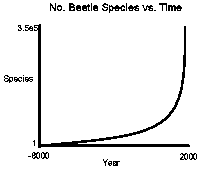
Casting aside all impressions of modesty, I have always been quite exceptional at mathematics. It has always come quite easy to me. I might have become a math major, but I see no viable careers in mathematics (other than Professor of Mathematics). When I hear the story of the Flood, I can say, from a position of some authority, that things don't quite add up.
This examination is dedicated to Fundamentalist Christians, specifically to Young-Earth Creationists. In case you are unfamiliar with the terminology, Young-Earth Creationists are those Christians who believe that the Earth was created some six to ten thousand years ago, exactly as it is written in the Bible. Old-Earth Creationists, by contrast, believe that the scientific dating of the age of the universe and this planet is correct, but that God created it all, setting everything into motion and perhaps guiding the outcome.
The Roman Catholic Church, by its admission of the validity of evolution, would be classified as Old-Earth Creationist. Old-Earth Creationism is clearly a more valid, saner position. On the other hand, there is absolutely no biblical justification for this view, and it therefore is an admission of the imperfection of the Bible.
The story of Noah's Flood is perhaps the single most ridiculous story I have ever heard, from any religion, ever. The unbelievable logistics of such a thing, combined with all the scientific impossibilities and theological problems, make it completely and unequivocally false. It is an insult to the Judeo-Christian god to propose such an improbable and impossible task to rid the world of wickedness. To claim that any god would see such an undertaking as the best way to accomplish his goals is ludicrous.
I could probably fill a book with all the problems associated with Noah's Flood, but that seems impractical. I have decided to focus on one very specific problem. First, though, we need to establish the core of what I am arguing against.
Those who claim that Noah's Flood is historical fact claim that all of the fossil remains found, like from the dinosaurs, are a result of the Flood. The animals drowned, floated down, and there they have lain, untouched, until some geologists and paleontologists stumbled upon them. There are hundreds of problems with this explanation, but people still assert it.
Such people also claim that two of every animal was on the Ark, or two of every unclean animal and seven of every clean animal (there are conflicting Bible verses, if you would believe that). This is what I want to talk about.
What about the beetles? Beetles couldn't have possibly survived the rainfall necessary to raise the floodwaters, so they must have been on the Ark. I think we would all agree to this. Two of them, I would assume, unless the ancient Jews ate beetles. Now something doesn't quite add up. You see, there happen to be, approximately, 350 thousand species of beetle.
Let me say that again, because it is a very important point. There are 350,000 different species, different types, of beetle. They are a small, well-adapted species. Like rats, they eat waste (sometimes specializing in dung) and scavenge for food. Some beetles fly, some have brilliant camouflage, some hiss and bite, and some write hit songs (I could not resist). They are a family of animals that, as a whole, adapts, evolves, and specializes very, very well. They are a credit to God's creation, if you believe in that sort of thing.
Because microevolution (changing of one species into two close species that are unable to interbreeed) is observed and documented scientific fact, even the most hardcore Creationists are forced to admit that some evolution does indeed occur. Their claim, however, is that no animals change "kinds". This terminology comes from the KJV of the Bible. They say that the animals present on the Ark spread out and multiplied, and that some variations within species do occur (like dog sub-species, but with more variety). They say that no animals really change types, or "kinds", such as a horse into a donkey, or an ape into what we call a human. (Note: human=type of ape.)
They cannot and will not say that evolution across the "kinds" line occurs, and if it does they somehow manage to change the rules for what they really meant by "kinds". Admitting that such a thing can occur means that evolution on a global scale is possible. They have already convinced themselves of the opposite.
With such rules in place, the beetle problem has just gotten worse. If, as the Creationists say, all beetles on Earth came from two beetles on the Ark, some interesting numbers come up. Since Young-Earth Creationist believe the Earth is only six to ten thousand years old, I'll give them the benefit of the doubt and say that the Earth is a little more than ten thousand years old. For the sake of argument, let's say that Noah's Flood happened ten thousand years ago around the year 8000 BC.
This is rather simple math that a child could do, if he didn't get confused by all the zeros: 350,000 species / 10,000 years = 35 new species of beetle per year on average. Thirty-five new species, every year. This means that the graph would look like this:

